The Keys to Citizenship have been reimagined as a tool for exchange and learning based on wisdom from the Australian Aboriginal community.
Authors: Silvana Oxenbridge-Pidhirny, Dougal McLachlan & Natalie Green
Silvana Oxenbridge-Pidhirny, Dougal McLachlan and Natalie Green have reimagined the Keys to Citizenship as a tool for exchange and learning based on wisdom from the Australian Aboriginal community. A big thank you to all the back office staff at Avivo for developing and sharing this approach.
For over 50 years, Avivo has supported the West Australian community to live life. We work with people and families who need support due to disability, ageing or mental ill-health. We support people from different cultures and backgrounds, and we respect that people live their lives in many different ways. We build and maintain relationships with people from all walks of life. We’re not-for-profit, non-denominational and open-minded, and our teams reflect the diverse society we live in.
Over the next two years Avivo is embarking on an exciting journey to develop stronger teams and support people really well into the future. We’re calling this transformation Working Locally. At the heart of this transformation is the concept of citizenship and we want to make it central to the lives of both our customers and employees.
Avivo had already hosted a number of engagement opportunities but we realised that all of these had been aimed at customers, support workers or community services coordinators in the office. Nothing had been held for the back-office employees in the support functions such as Finance, HR, IT etc. and something had to be done to reach these important employees, so we formed a working group of volunteers to begin the conversation about citizenship and self-management.
The working group decided that we should hold workshops for all the back-office staff but what we would present and who would deliver it was still a conundrum.
The concept of citizenship can be quite tricky for back office employees to connect to and relate to their day-to-day roles. Our working group struggled for some time trying come up with a way of explaining the Keys to Citizenship and how they relate to our work.
Until one of the group members had a light-bulb moment.
Sil, a Kija woman (an Indigenous group from the East Kimberley region of Western Australia) recalled an activity that she had done at an Aboriginal workshop that really got through to her. The activity was a story-telling exercise where people were given a series of words around a certain theme. People were then asked to associate their own words with each of the words that they had been given. They then threaded all their words together to create their own unique story, which they told back to the whole group.
The working group thought that the 7 Keys to Citizenship would be perfect as a basis for this exercise. After some tweaking and rehearsals (and a few nerves!) three workshops were held and the story-telling exercise was at the forefront of each workshop.
Workshop participants were shown Simon’s video explaining the Keys to Citizenship.
Trees were used to represent each key and a river was drawn to connect them. The trees and the river were drawn on a whiteboard with a Key to Citizenship underneath.
Sil, who facilitated the session, invited the group to think about each Key and then call out the words that they associated with them. As the words were called out they were written onto the corresponding tree. Once all the trees had been filled up with words and everyone had added all their words it was time to build the story. Sil went first and linked her words together as an example and then asked individuals to come up and share their stories.
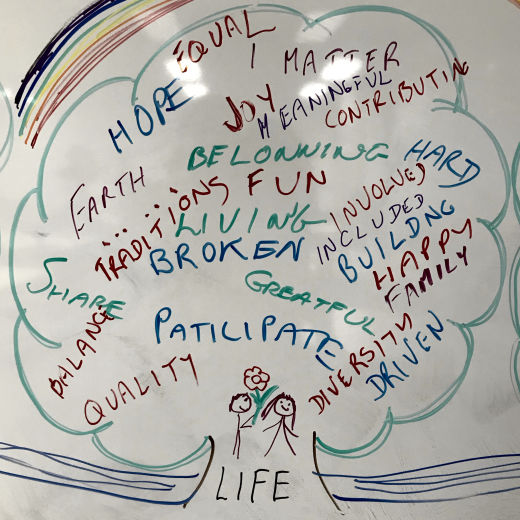
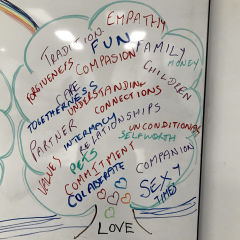
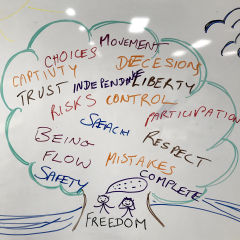
It was unbelievable how well-suited this exercise was to explaining the Keys to Citizenship because it put each individual at the centre of the story and allowed them to explore what each key meant for them.
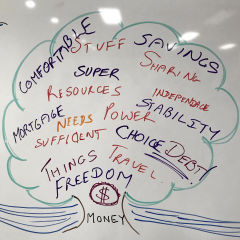
There was an amazing variety of words associated with each Key along with a lot of overlap between the keys. Some words were light-hearted and humorous; some were more personal; some were surprising.
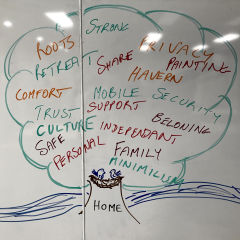
Linking the words through personal stories helped join the Keys together and allowed people to connect their unique perspectives and experiences to the concept of citizenship.
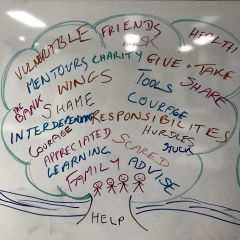
Every workshop was very different depending on who was in the room and what the dynamic of the group was like and this was reflected in the types of words and stories that were shared. Some stories were very personal and emotional, some were based on work experiences, and others used the opportunity to share something no one else knew about them.
Citizenship is for everyone and we want all employees, regardless of what parts of an organisation they may work in, to have a go at connecting with the 7 Keys.
Storytelling is an awesome way of transferring knowledge and the exercise that we used is a great way to connect with each Key to Citizenship and make the abstract personal.
The process of getting up and telling your personal story in front of the group also puts people in a very vulnerable situation. Work colleagues seeing each other in this position helps to strengthen the bonds between them and the community as a whole, which is itself a crucial aspect of citizenship.
So why not give it a try? You may be surprised what you find out about your work mates and yourself!
Find out more about Avivo at: https://www.avivo.org.au
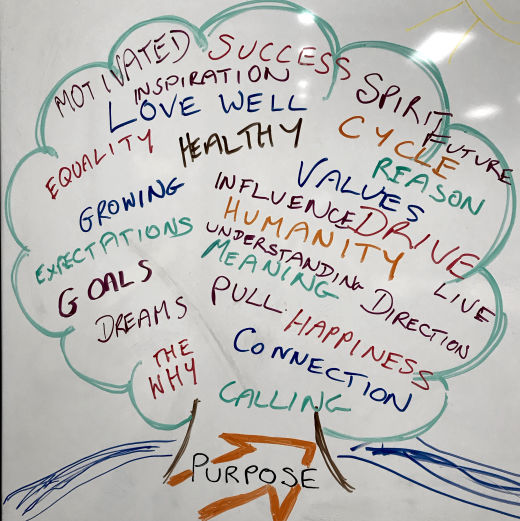
The publisher is the Centre for Welfare Reform.
Connecting to Citizenship by Storytelling © Silvana Oxenbridge-Pidhirny, Dougal McLachlan &Natalie Green 2018.
All Rights Reserved. No part of this paper may be reproduced in any form without permission from the publisher except for the quotation of brief passages in reviews.
disability, Australia, Inspiration